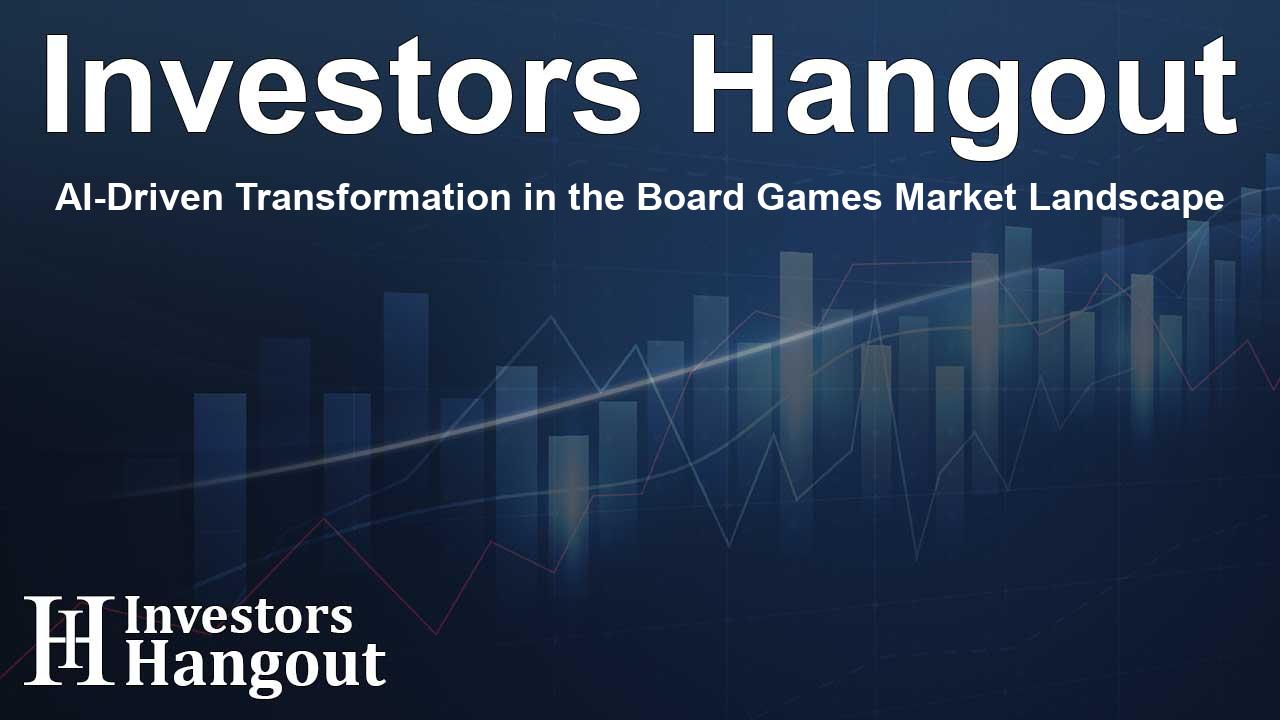AI-Driven Transformation in the Board Games Market Landscape

AI and Board Games: A Growing Market
The board games market is undergoing significant transformations, with expectations to expand by USD 5.17 billion between the forecast years of 2025 and 2029. This remarkable growth is fundamentally linked to advancements in technology and the increasing popularity of board games across various demographics. The market is projected to grow at a compound annual growth rate (CAGR) of 9.5%. A surge in digitalization is reshaping how traditional games are played, making it essential for industry players to innovate continuously.
Current Trends Boosting Market Growth
One of the most compelling drivers behind the growth of the board games market is the emphasis on mental well-being. Parents are seeking ways to reduce children's dependence on electronic devices, and many are turning to time-tested board games. Classics such as Chess and Monopoly continue to flourish, while newer titles lend themselves to stress relief and social interaction. This new wave of interest emphasizes the educational benefits that board games can provide, enhancing social skills and relationships.
Digital Integration
The rise of online gaming platforms and communities is helping to modernize the experience of board gaming. Titles like Dungeons & Dragons have been successful in creating immersive experiences that allow for character development and storytelling. This evolution signifies a critical movement towards integrating traditional experiences with modern technology.
The Need for Social Interaction
Board games offer a unique communal setting, encouraging players to engage in face-to-face interactions. This aspect becomes especially appealing in contrast to an increasingly digital lifestyle. From cafes to dedicated board game venues, these games create opportunities for meaningful social experiences, fostering bonds among players.
Market Challenges
Despite the flourishing growth, the board games market also faces its share of challenges. The encroachment of mobile gaming remains a significant challenge. Mobile games provide instant entertainment through superior graphics and engaging storylines accessible via smartphones and tablets. Attention spans are dwindling, drawing players away from traditional board games towards mobile platforms noted for their ease of access and diverse offerings.
Future of Board Games
The board games industry continues to innovate, with publishers incorporating mobile apps and online versions that enhance traditional gameplay experiences. Hasbro exemplifies this shift with its relaunch of products that utilize popular digital platforms like Roblox. This strategy engages a younger, more digitally-savvy audience, thereby expanding the reach of board games.
Diverse Product Segments
In terms of market segmentation, the product range encompasses various types of games, including tabletop, card and dice, and role-playing games. This diversity contributes to the fragmented nature of the market, fostering a competitive landscape. Each segment caters to distinct consumer preferences and cultural inclinations, further broadening the appeal of board games worldwide.
Engaging Younger Players
Segmenting products by age demographic has become essential, with options available for various age groups. Engaging younger players through simple yet captivating gameplay fosters a love for board games from an early age. Parents can likely choose from a multitude of games designed for children aged 2-5, as well as options for older children and adults.
Conclusion: The Timeless Nature of Board Games
Despite many challenges, including the allure of digital gaming, board games retain their timeless charm and continue to evolve. They promote cognitive skill enhancement, strategic thinking, and provide an engaging form of entertainment that transcends generations. Whether in a cozy cafe or a living room, the joy of gathering around a table with friends or family holds a unique and essential place in our lives.
Frequently Asked Questions
1. What is driving growth in the board games market?
Growth is primarily driven by the increasing interest in mental wellness and limited screen time for children, alongside technological advancements enhancing gameplay.
2. How are digital platforms affecting traditional board games?
Digital platforms are modernizing board games by making them more accessible and integrating online features, attracting new audiences.
3. What challenges does the board games market face?
The main challenge is the dominance of mobile gaming platforms, which offer easy-to-access entertainment options for diverse age groups.
4. How can board games benefit educational settings?
Board games can enhance cognitive skills and social interaction, making them effective tools for teaching in educational environments.
5. What future developments can we expect in this market?
Future developments will likely focus on further integration of technology with traditional gameplay, creating engaging and interactive experiences for players.
About The Author
Contact Addison Perry privately here. Or send an email with ATTN: Addison Perry as the subject to contact@investorshangout.com.
About Investors Hangout
Investors Hangout is a leading online stock forum for financial discussion and learning, offering a wide range of free tools and resources. It draws in traders of all levels, who exchange market knowledge, investigate trading tactics, and keep an eye on industry developments in real time. Featuring financial articles, stock message boards, quotes, charts, company profiles, and live news updates. Through cooperative learning and a wealth of informational resources, it helps users from novices creating their first portfolios to experts honing their techniques. Join Investors Hangout today: https://investorshangout.com/
The content of this article is based on factual, publicly available information and does not represent legal, financial, or investment advice. Investors Hangout does not offer financial advice, and the author is not a licensed financial advisor. Consult a qualified advisor before making any financial or investment decisions based on this article. This article should not be considered advice to purchase, sell, or hold any securities or other investments. If any of the material provided here is inaccurate, please contact us for corrections.
